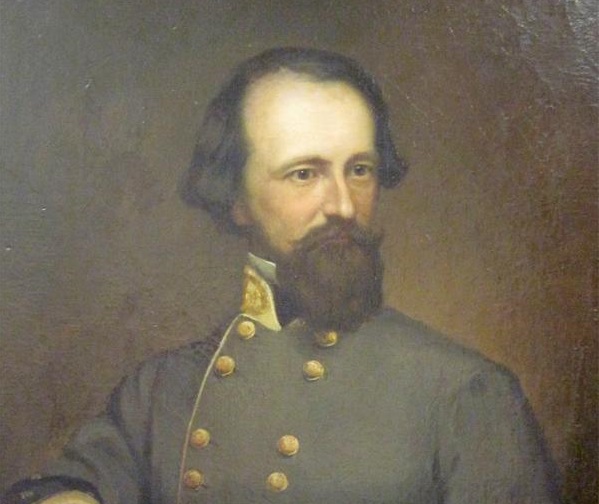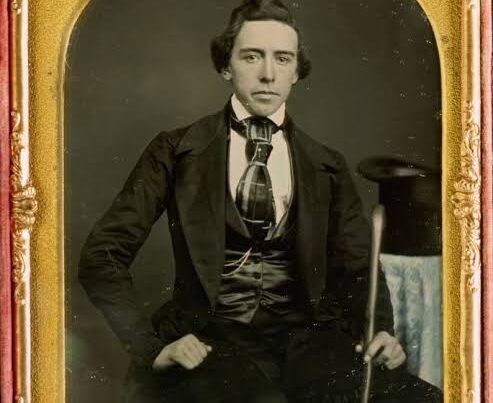One-hundred and fifty-two years ago, April 9, 1865 was a Palm Sunday just as today, and in the central part of war-torn Virginia, a major turning point occurred in American history. General Robert E. Lee, that “chevalier sans peur“—that knight without fear—surrendered the tattered remnants of the proud Army of Northern Virginia to General Ulysses S. Grant, setting in motion the end phase of the War for Southern Independence.
That war was in reality not a “civil war,” that is, it was not a war between two aggrieved parties within the American nation. Rather, it was a war between two ideas of government, and, in reality, two ideas of history and progress. For the North, which now controlled the Federal government, it was a war to suppress what was seen as a rebellion against constituted national authority. For the states of the Southern Confederacy, it was a defense of their inherited and inherent rights under the old Constitution of 1787, rights that had never been ceded to the Federal government. And, more, it became for them a Second War for Independence against an arbitrary and overreaching government that had gravely violated that Constitution.
Thus, at Appomattox were set into motion momentous events in the future of the reconstituted American nation. With the defeat of the South, the restraints on industrial, and, eventually, international capitalism were removed. The road to centralized government power was cleared. But even more significantly, there was a sea change in what we might call “the dominant American philosophy.”
In the old ante-bellum Union the South had acted as a kind of counter-weight to the North and a quickly developing progressivist vision of history. Certainly, there were notable Southerners who shared the growing economic and political liberalism of their fellow citizens north of the Mason-Dixon Line (e.g, DeBow’s Review). Yet, increasingly in the late ante-bellum period, the most significant voices in the Southland echoed a kind of traditionalism somewhat reminiscent of the serious critiques being made in Europe of “the Idea of Progress” and of the deleterious effects of 19th century liberalism.
The historian Louis Hartz once commented that in the ante-bellum South, particularly during the 1840s and 1850s, the South country experienced what he termed a “reactionary Enlightenment.” The great novels of Sir Walter Scott dominated in Southern libraries; Chateaubriand and the works of the writers of Romanticism were devoured by the reading public (which was quite large). The Oxford “High Church” Movement (1840s and beyond) found many devotees and converts. Many scions of Southern families were sent to Europe for education.
Not just George Fitzhugh, but other notable writers such as George Frederick Holmes, James Henley Thornwell, and Robert Lewis Dabney (who wrote his most devastating criticism after the war of “the New South Creed”), questioned the progressivist narrative and defended the stasis of Southern society. For them “stasis” was not the same thing as “static” and “backward,” but rather an understanding that an equilibrium in society, ordered under the unchanging rules of God’s law and the laws of nature, was the surest way to meet, sift through, and verify the many challenges offered by the ideologies of the times. It was essentially a conservative vision.
These Southern writers did not oppose all progress, but, then, much of the “progress” they viewed around them was illusory and destructive not only of their society, but of their very existence as a people.
In 1860 one of the Confederacy’s most talented generals, whose life was cut short in the retreat from Gettysburg, the Tar Heel James Johnston Pettigrew, authored his account of his sojourn in Europe (1859), Notes on Spain and the Spaniards. It is one of the most remarkable, if still largely unknown to the general public, books ever written by an American. [Note: There is a University of South Carolina Press reprint of the original; and Clyde Wilson’s biography of Pettigrew, Carolina Cavalier, is an excellent introduction.]
Let’s take a closer look at Pettigrew and his Notes on Spain.
Pettigrew came from a prominent North Carolina planter family. Like many young Southern men of his class, he traveled in Europe, but most importantly, to Spain. His vibrant and deeply thoughtful descriptions rival the most brilliant of philosophical “travelogues,” and compare favorably with Hilaire Belloc’s The Path to Rome. For Pettigrew, Notes on Spain became a vehicle for a not-so-veiled, favorable comparison of Spanish customs and culture with those of his own Southland, and even more importantly, a searing critique of the “philosophy of Progress” and the idea that “science” and “evolution” were the new salvation for mankind. His superb defense of orthodox revealed religion and his unparalleled put down of “scientism” remain, by any standard, impressive.
That volume contains many superb and poetic passages that deserve quoting. Upon entering the magnificent Seville Cathedral, for instance, Pettigrew observes that:
“….A faint gleam of light, struggling through the painted windows of the dome, fell upon the lofty crucifix, and seemed to point to the life of purity beyond. At such a time, one cannot but feel that there is an ethereal spirit within, a spark of the Divine essence, which would fain cast off its prison house of mortality and flee to the Eternal existence that gave it birth. This edifice is one of few creations of man that realizes expectation. Morning, noon, and night, none can enter without acknowledging that he stands on holy ground. The accessories, the trembling swell of the organs, the sweet odor of incense, the beautiful works of art, which elsewhere distract the attention, here combine in universality of grandeur to establish that harmony of the soul so conducive to devotion; and if the excellence of the architecture consist in the accomplishment of the rational purpose assigned, to this must the palm be awarded. Political economists may reason that such an expenditure in unproductive stone withdraws from the general circulation a sensible capital; the severe reformer may preach against the adoration of saints and images; but their remonstrance will fall pointless upon the heart. There are occasions when humanity rises above the earthly rules of logic; and acknowledges obedience only to those hidden laws which govern the divine portion of our nature, and whose sequence is beyond the reach of human intellect.” [Notes, pp. 186-187]
Experiencing life in a Spanish village drew forth Pettigrew’s views of patriotism and a defense of community. Certainly, thinking of his own native land, he muses:
“Local attachments are pronounced, by the modern school of social philosophers, to be relics of barbarism, ignorance and prejudice, forgetting that prejudices are given us by the all-wise Deity, as well as reasoning faculties, and equally for some beneficent purpose. The time may come when prejudices will disappear, when one’s country will have no claim upon him than China or Hindostan, and the sufferings of the Bushmen will arouse as lively a feeling of sympathy as those of his fellow citizens. But this millennium has not yet reached Spain. Patriotism, an attachment to, a preference for one’s own home, is still a virtue prolific of measureless good, and for its foundation rests upon enlightened prejudice.” [Notes, p. 55]
Such language is reminiscent of that great English conservative, Edmund Burke.
At the Cathedral of Our Lady of Pilar, in Zaragoza, Pettigrew offers one of his most profound and philosophical passages. After an almost poetic recounting of his entry into the edifice and his dawning sense of awe and reverie, he offers a defense of revelation and traditional religion in words that bespeak what Russell Kirk termed moral imagination:
“Every revealed system [of religious belief] must rest for its foundation upon either reason or faith. The former decides upon evidence, scrutinized by the light of a critical intellect; the latter seeks its ‘evidence of things unseen’ only in the heart. How many of us have intelligence, learning or leisure to investigate the grounds of our belief in even the simplest article of faith? What immense erudition is requisite to decide whether the gospels containing a narrative of the Saviour’s life be forgeries, revelations or mere histories? How often do sects split upon the mere literal rendering of a Greek sentence? And if the learned, who have devoted their whole lives to this alone, be so feeble, how shall we expect strength of wisdom from the mass of mankind, who have not the first element of critical science? We believe in the existence of a Saviour, and denounce as infidels and horrible monsters all who refuse assent to our faith. And why do we thus believe? Because we have been told so in our youth by persons of learning and probity, in whom we have confidence, and whose better judgment in this matter we substitute for our own…. Even for the earth we need something more than morality or its virtues…. Some of the pleasantest recollections of my life are these Spanish cathedrals, where the somber grandeur of the architecture and the devotion of the congregation harmonized in elevating me above the mere materiality of existence.” [Notes, pp. 77-79]
Pettigrew, as did other contemporary Southern men of intellect, recognized that there were stark differences between his beloved Southland and an increasingly industrialized North. He sums that belief up, once again in Notes on Spain, when leaving France and entering Spain, a land in which he visualized analogously his own Southern homeland:
“Adieu to a civilization which reduces men to machines, which sacrifices half that is stalwart and individual in humanity to the false glitter of centralization, and to the luxurious enjoyments of a manufacturing, money age!” [Notes, p. 51]
The late historian Eugene Genovese, in his magisterial treatise, The Mind of the Master Class, explores in detail the high level of intellectual thought—profoundly traditionalist and anti- (or perhaps pre-) capitalist—that existed in the Old South. The virtual absence of that prescriptive and traditionalist voice in the post-war period and beyond signaled a sharp direction change for the as-yet-young American nation, the results of which continue to be felt today. It was the triumphant epigones of liberalism and imperialism, of the “nouveaux riches” and the political class they spawned, who would take the reins of American government and dictate its tawdry culture.
If the benighted American nation, besotted by cultural decadence and political corruption and intrigue, is ever to recover, it could do no better than to revisit the insights of men like Pettigrew and Dabney, the constitutionalism of Calhoun, and the moral discussions of James Henley Thornwell.







